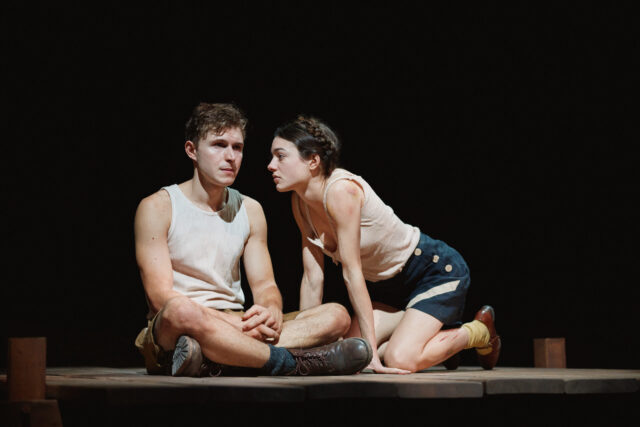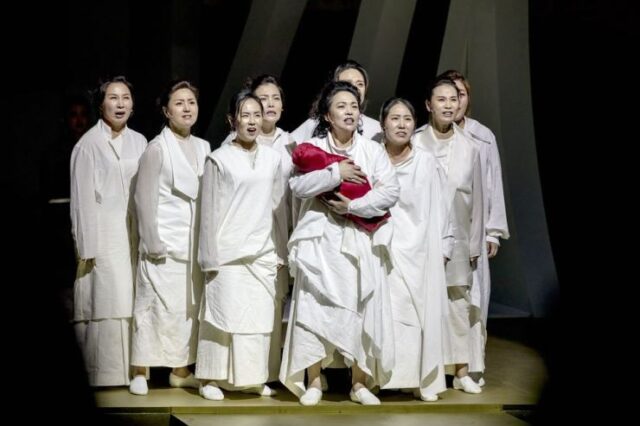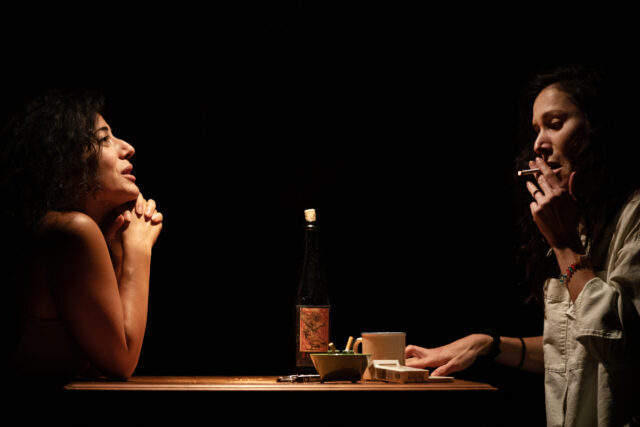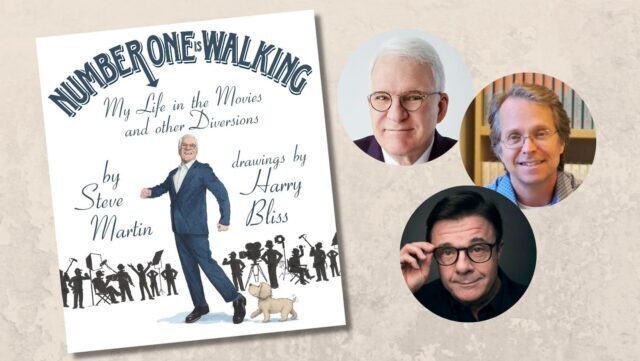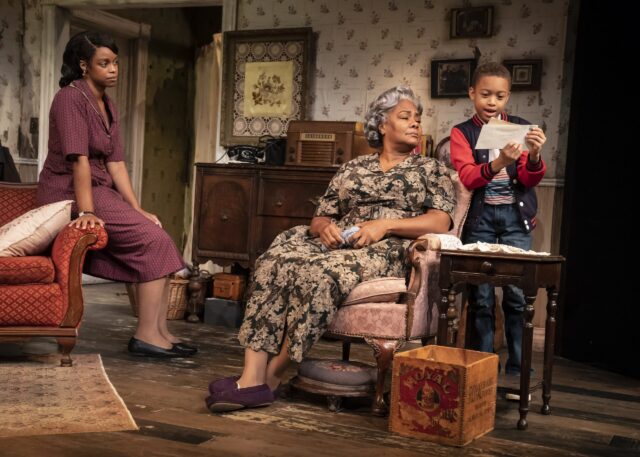
Ruth (Mandi Masden) and Lena (Tonya Pinkins) look on as Travis (Toussaint Battiste) is filled with hope in Public revival of A Raisin in the Sun (photo by Joan Marcus)
A RAISIN IN THE SUN
Newman Theater, the Public Theater
425 Lafayette St. at Astor Pl.
Through November 20, $80
publictheater.org
Tonya Pinkins rules the roost as Lena Younger in Robert O’Hara’s uneven adaptation of Lorraine Hansberry’s American classic, A Raisin in the Sun, continuing at the Public’s Newman Theater through November 20. Lena is the matriarch of the Younger family, who live in a cramped, paint-peeling, walls-cracking apartment on Chicago’s South Side. It’s the early 1950s, and she is waiting for a ten-thousand-dollar check to arrive, insurance money from the recent death of her husband (Calvin Dutton). Her thirty-five-year-old ne’er-do-well son, Walter Lee (Francois Battiste), is a chauffeur for a wealthy white man and dreams of using the money to put a down payment on a liquor store with his unreliable friends Bobo (Dutton) and Willy.
Walter Lee’s wife, Ruth (Mandi Masden), is doing her best to try to keep everything together, managing the finances as she and her husband raise their ten-year-old son, Travis (Toussaint Battiste or Camden McKinnon), who sleeps on the couch in the middle of the apartment. Lena’s twenty-year-old daughter, Beneatha (Paige Gilbert), shares a bedroom with her mother and is hoping to go to medical school; Beneatha has two suitors, the rich but dull George Murchison (Mister Fitzgerald) and Joseph Asagai (John Clay III), a university student from Nigeria who Beneatha believes can help connect her to her African roots. Every morning the Younger clan wakes up and hustles off to the bathroom, which is down the hall, used by all of the floor’s tenants.
When Lena buys a house in the white neighborhood of Clybourne Park, Walter Lee feels betrayed. The plot gets more complicated when Karl Lindner (Jesse Pennington), from the Clybourne Park Improvement Association, arrives to attempt to convince the Youngers not to move there, barely disguising his racism with pointed threats. (Lindner also appears in Bruce Norris’s Pulitzer Prize winner Clybourne Park, which examines things from the opposing point of view, as the association decides how to discourage a Black family from moving in.)
But Lena is determined to raise her family’s station in life, having earlier told Ruth in one of the play’s most poignant moments: “‘Rat trap’ – Yes, that’s all it is. I remember just as well the day me and Big Walter moved in here though. Hadn’t been married but two weeks and wasn’t planning on living here no more than a year. We was going to set away, little by little, don’t you know, and buy a little place out in Morgan Park. We even picked out the house. Looks right dumpy today. But Lord, child, you should know all the dreams I had ’bout buying that house and fixing it up and making me a little garden in the back. And didn’t none of it happen.” The play’s focus on real estate seems sadly prescient considering the ongoing issue of housing in the US, an issue that’s never been resolved and has exploded into a full-blown crisis in recent years.
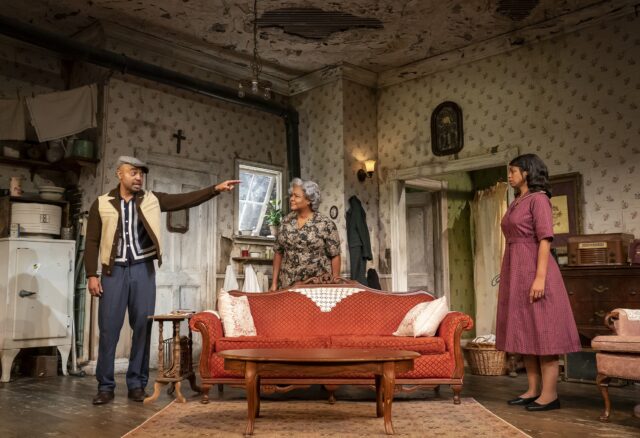
Walter Lee (Francois Battiste) has something to say to his wife, Ruth (Mandi Masden), in new version of Lorraine Hansberry classic (photo by Joan Marcus)
Tony winner Pinkins (Caroline, or Change; Red Pill) commands the audience’s attention with a dazzling presence as she and O’Hara make Lena the central character in a role previously portrayed by such actors as Claudia McNeil, Juanita Moore, Esther Rolle, Phylicia Rashad, and LaTanya Richardson Jackson. The focus of A Raisin in the Sun is usually on Walter, who has been played by Sidney Poitier, Earle Hyman, Danny Glover, Sean Combs, and Denzel Washington; Washington, for example, dominated in Kenny Leon’s 2014 Broadway revival, but Battiste’s Walter is not as imposing, though it is touching that his real-life son alternates as Travis. Gilbert (School Girls; or, the African Mean Girls Play, The Rose Tattoo) gives Beneatha an underlying strength, representing the future of Black America, while Masden (Saint Joan, Our Lady of Kibeho) is affecting as a realistic woman who can’t find the time for her own dreams. “Honey, you never say nothing new,” she tells Walter Lee. “I listen to you every day, every night and every morning, and you never say nothing new. So you would rather be Mr. Arnold than be his chauffeur. So – I would rather be living in Buckingham Palace.”
Clint Ramos’s set, Karen Perry’s costumes, Alex Jainchill’s lighting, and Elisheba Ittoop’s sound are effective, setting the right mood for Hansberry’s powerful commentary on race, class, and housing in America, which is as relevant as ever more than sixty years after its debut. Unfortunately, O’Hara fiddles around too much to put his mark on the production, as he has done recently with revivals of Long Day’s Journey into Night, a streamlined version set in the Covid era, and Richard III at the Delacorte, with Danai Gurira as the conniving title character.
O’Hara has much more success with new plays, including Jeremy O. Harris’s Slave Play, Gurira’s Eclipsed and The Continuum, and his own Bootycandy. His 2010 play The Etiquette of Vigilance imagines where the Younger family is fifty years after Raisin.
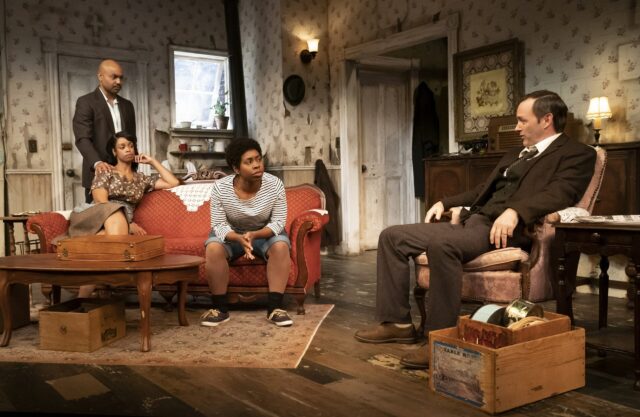
Karl Lindner (Jesse Pennington) tries to talk the Younger family out of moving to his white neighborhood (photo by Joan Marcus)
Perri Gaffney injects a burst of energy as the gossipy Mrs. Johnson, but there’s a reason why that scene is usually cut, as it feels out of place and unnecessary. The occasional presence of Lena’s husband’s ghost seeps into melodrama, while a key speech by Walter Lee near the end of the play shatters the fourth wall as it accuses the (mostly white) audience directly of its complicity in his situation.
When Raisin (the title comes from the Langston Hughes poem “A Dream Deferred,” in which the Harlem Renaissance writer and activist asks, “What happens to a dream deferred? Does it dry up / like a raisin in the sun? / Or fester like a sore — / And then run?”) began its run at the Newman, the Public was also presenting Elevator Repair Service’s Baldwin and Buckley at Cambridge at the Anspacher, complete with a coda that also broke the fourth wall and involved Baldwin (Greig Sargeant) and his good friend Hansberry (Daphne Gaines). It’s possible to try too hard with classic material; it’s better to trust the play more even while adding your imprimatur.


